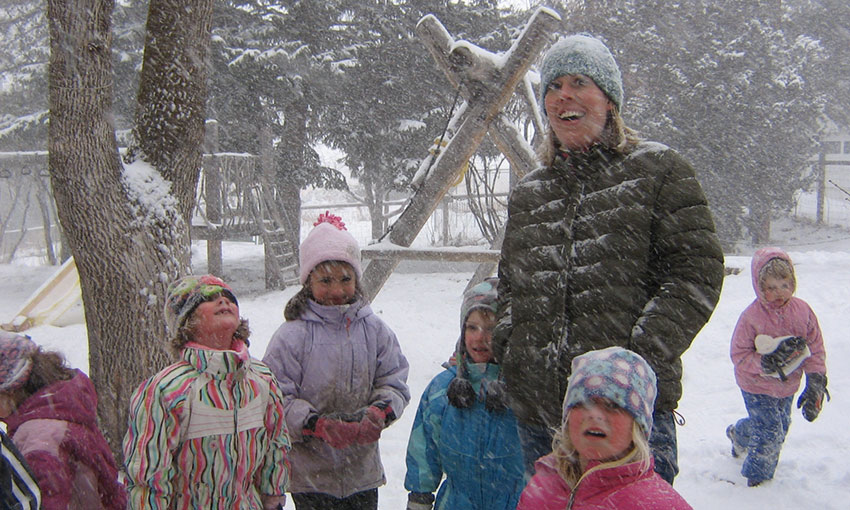Programs & Rates

General Program Information
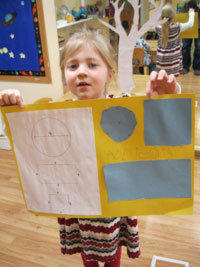 Sourdough Montessori offers full-year pre-school programs which feature an academic year, (late August through early June), and summer session, (mid-June through late August). We service students aged three to six with a full Montessori curriculum which includes lessons in Practical Life, Language, Art, Math, Geography, Science, Music, Movement, Cultural Awareness, and Sensorial exercises.
Sourdough Montessori offers full-year pre-school programs which feature an academic year, (late August through early June), and summer session, (mid-June through late August). We service students aged three to six with a full Montessori curriculum which includes lessons in Practical Life, Language, Art, Math, Geography, Science, Music, Movement, Cultural Awareness, and Sensorial exercises.
For the mornings, our pre-school students work together in a mixed age setting of three to six year olds that allows each to benefit from the other. The older kids, who generally master skills sooner, feel the pride of mentoring the younger children by helping them with their lessons. The younger children feel more connected to both their class as a group and their own work as they see and work with their older peers. In the afternoons, our older students meet together to pursue their own enhanced curriculum.
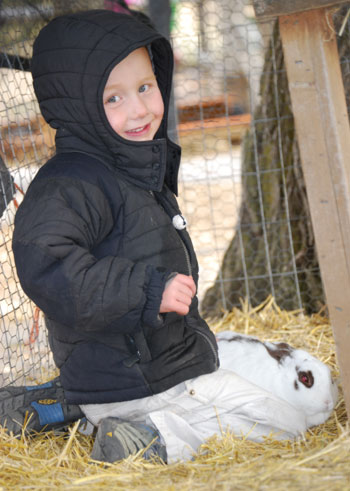 The Whole Child
The Whole Child
We care for the development of what we call the whole child – by which we mean the child's mind, body and spirit. A balance of classroom time and outdoor play is thus offered to facilitate both intellectual as well as physical growth. Healthy snacks are also offered all day long to best meet the nutritional needs of our students. The overall self-esteem and energy of the child is something we are equally aware of and interested in nurturing.
Independence / Order
A hallmark of the Montessori classroom is the relative independence it offers the student. While this is certainly the case at Sourdough, we make sure our students enjoy their freedom in the context of a group that has clear rules, both inside the classroom and outside, to maintain order and ensure that our environment is safe and enjoyable for all. Students learn, for example, that a work, (the name we give to an independently pursued learning exercise), may only be used if it is available, and only to the extent the student has been shown how to use and handle the work, (for reasons more involved than a parenthetical digression). There are guidelines for where a work can be done, (only in an appropriate area with enough open space to comfortably set down an area mat or work at a table), and limitations on when the child can perform their chosen work, (we can't do painting when it is lunch time even if we really, really want to).
Order in the class, both amongst our Sourdough students and within the physical design and layout of the school, (the space itself is clean, neat and open), helps to create an environment that is peaceful and calming – perhaps shockingly so, at least to the many who come away from their initial Sourdough experience expressing a certain disbelief, (bordering on shock), at the sight of so many of our kids working so effectively - and so quietly, at once before them.
Peace Education
 We teach the importance of the care for our environment and the things in it. This includes emphasis on the objects we see and study in nature as well as our classroom materials. We also learn about the importance of care for each other. Concepts of peace and the peaceful resolution of conflict, and principals based on the values of compassion and understanding of others are central not just to our curriculum, but represent the very essence of our spirit as a school. Many families tell us that long after their children have graduated from our school, they still employ techniques and approaches they learned at Sourdough to help in the always difficult challenge of getting along well with others.
We teach the importance of the care for our environment and the things in it. This includes emphasis on the objects we see and study in nature as well as our classroom materials. We also learn about the importance of care for each other. Concepts of peace and the peaceful resolution of conflict, and principals based on the values of compassion and understanding of others are central not just to our curriculum, but represent the very essence of our spirit as a school. Many families tell us that long after their children have graduated from our school, they still employ techniques and approaches they learned at Sourdough to help in the always difficult challenge of getting along well with others.
Our Classrooms
We have two classrooms; upstairs – with a capacity of 28 students, and downstairs with a capacity of 18.
Our Student Teacher Ratios
Student teacher ratios are 8/1 or less. Each classroom has at least one fully trained and accredited Montessori teacher and the teachers work together in a team approach that is centered on the development of the child.
Hours of Operation
Our hours of care are 7:45 a.m. to 5:45 p.m. Monday through Friday. We are closed for most major holidays and seasonal breaks but open year long.
Sourdough Montessori School
Programs and Rates
2020/2021 Programs & Rates
Hours of Operation: 7:45 a.m. - 5:30 p.m.
Half Day Program 7:45 a.m. to 12:45 p.m.
| 3 Half Days | $665/month |
| 4 Half Days | $750/month |
| 5 Half Days | $795/month |
Full Day Program 7:45 a.m. to 3:20 p.m.
| 2 Full Days | $630/month |
| 3 Full Days | $760/month |
| 4 Full Days | $865/month |
| 5 Full Days | $935/month |
Late Day Program 3:30 p.m. - 5:30 p.m.
| 3 Late Days | $140/month |
| 4 Late Days | $160/month |
| 5 Late Days | $180/month |
*Late day is offered to children 4 years and older or 3 year
olds who are napping due to the length of the program*
Additional Fees
| New Student Application Fee | $90 (non-refundable) |
| Annual Enrollment/Supplies Fee | $235 (non-refundable) |
| Tuition Deposit | $500 (held for duration of enrollment) |
| New Student Orientation Day | $35 |
| Music | $20/month |
| Field Trips | Actual cost |
| Drop In Day Fee | Half Day: $45/day; Full Day: $65/day |
2021 Rates, Documents and Applications
-
Sibling Discounts: A 10% discount is provided for enrolled sibling students.
Partial Scholarship Applications Available Upon Request
Primary Enhancement Program
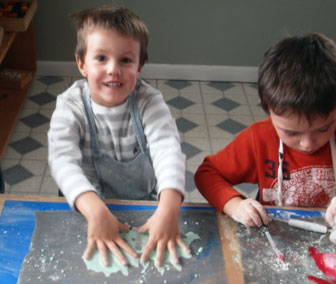 The last year of the Montessori program is really the icing on the cake for our Sourdough students. Over their first 2 years at Sourdough they have watched their older peers doing the things older kids do at Sourdough: reading, writing, solving complex math problems, going on special field-trips, and more. Our older students become the class leaders, teaching and sharing with their younger counterparts the skills they have mastered, (such as zipping coats, tying shoes and reading books), and the principals they have learned to appreciate, (such as conflict resolution). They are our “junior staff” and when it is finally their turn to be a kindergartner at Sourdough, it is like a time of harvest for the entire child has become!
The last year of the Montessori program is really the icing on the cake for our Sourdough students. Over their first 2 years at Sourdough they have watched their older peers doing the things older kids do at Sourdough: reading, writing, solving complex math problems, going on special field-trips, and more. Our older students become the class leaders, teaching and sharing with their younger counterparts the skills they have mastered, (such as zipping coats, tying shoes and reading books), and the principals they have learned to appreciate, (such as conflict resolution). They are our “junior staff” and when it is finally their turn to be a kindergartner at Sourdough, it is like a time of harvest for the entire child has become!Our students engage in numerous special events and field trips including, (but not limited to);
- The One Hundred Day Celebration
- The Egg Drop Event
- Day trip to Lewis and Clark Caverns
- Cross Country Ski Trip to Bohart Ranch
- Graduation Ceremony
Music
In addition to several circle times with an emphasis on music development, a professional music eacher joins us one morning to conduct a fun, acive, music and movement class with the children in a small group atmosphere.
Daily Schedule
Morning arrival time 7:45 to 8:45 Montessori classroom time 8:45 to 11:00 Circle Time 11:00 to 11:30 Lunch time 11:30 to 12:00 Outside play time 12:00 - 1:10 Pick up time for half-day schedule 12:45 Nappers go to nap room 12:30 Afternoon line time begins 1:15 Afternoon Montessori work period 1:50 to 3:00 Outside play time 3:00-3:20 Pick-up time for full-day schedule 3:20 Late Day Program 3:30 to 5:30
Summer Session
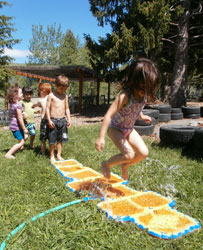 The summer program begins in mid-June and runs for approximately nine weeks. In mid-August, the school closes two weeks as we get set for the new school year. Participation in the summer program is very flexible offering a variety of schedules.
The summer program begins in mid-June and runs for approximately nine weeks. In mid-August, the school closes two weeks as we get set for the new school year. Participation in the summer program is very flexible offering a variety of schedules.
School Calendar
Sourdough Montessori’s academic school year runs for approximately 10 months (late August to mid June), generally following the same schedule as the Bozeman Public Schools. Our school closures include the following:
- Major holidays
- Thanksgiving weekend
- Two weeks for Winter Break
- One week for Spring Break
- One staff in-service day
- Four days for parent teacher conferences
- Three days prior to the start of the summer program and approximately 2.5 weeks at the end of the summer for classroom set-up/preparations for the start of the fall semester.
Student Visit/Readiness Assessment
We accept three to six year old children based on their readiness for our program. An essential part of readiness for the incoming child is that they are fully potty-trained and have developed independence in using the bathroom. This and other issues can be more fully discussed during the parent’s initial tour of our school, (which is done without the child). An additional visit with the child allows us to evaluate the child’s development. At this time we can make the initial determination as to whether we feel our program is right for your child.
Curriculum and Classroom
 Our classrooms are organized by subject and offer a wide array of Montessori materials, (called “works”), which are designed to enhance the development of the learning three to six year old child. Our students regularly work independently on the lesson of their choice (after a teacher has shown it to them), choosing from the various areas of the classroom: practical life, sensorial, language, math, cultural materials, and art. Our curriculum also includes Spanish, music, peace education and a couple of field trips a year as well as a rich exposure to many cultural topics through our rotating monthly themes. Details about our curriculum can be found in our Parent Handbook.
Our classrooms are organized by subject and offer a wide array of Montessori materials, (called “works”), which are designed to enhance the development of the learning three to six year old child. Our students regularly work independently on the lesson of their choice (after a teacher has shown it to them), choosing from the various areas of the classroom: practical life, sensorial, language, math, cultural materials, and art. Our curriculum also includes Spanish, music, peace education and a couple of field trips a year as well as a rich exposure to many cultural topics through our rotating monthly themes. Details about our curriculum can be found in our Parent Handbook.We have two primary mixed-age class groups; the upstairs classroom which holds 28 students and is staffed with four teachers, and the downstairs classroom which has 16 students and two teachers. All children spend their mornings in their designated class, (when they are not outside playing). In the afternoon, the youngest children nap, (in our Nap Room, and the other children convene in an upstairs classroom.
Lunches and Snacks
Parents are required to provide a healthy lunch for the child. The school serves snacks three times during the course of a school day. Parents contribute to snack foods one week out of each year.
Before Your Child Starts
- Call the school to schedule a visit with your child. Bring all enrollment paperwork you have received at this time. We will give you any remaining paperwork you haven’t yet received (Parent Handbook, an updated calendar for the school year, a list of monthly themes, etc.)
- Complete the following forms:
- Enrollment Form and Tuition Agreement [PDF]
- Emergency Contact Form (yellow form) - be sure to sign and date it!
- Record of Immunizations (blue form)
- Profile of your Child (pink form)
- Read the Parent Handbook and sign the acknowledgment form.
- Plan to attend the new parent orientation in the fall. This is usually held the second or third week of September.
A Typical Day at Sourdough
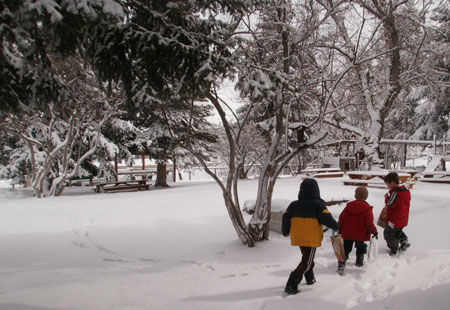
Is there such a thing as a typical day at Sourdough? Sort of. For while it seems no two days are ever quite the same, and the nature of our work changes with our regularly varying Themes, our days generally follow a certain order that looks something like this:
Our Daily Day
Montessori classroom time 8:45 to 11:00 Circle Time 11:00 to 11:30 Lunch time 11:30 to 12:00 Outside play time 12:00 - 1:10 Pick up time for half-day schedule 12:45 Nappers go to nap room 12:30 Afternoon line time begins 1:15 Afternoon Montessori work period 1:50 to 3:00 Outside play time 3:00-3:20 Pick-up time for full-day schedule 3:20 Late Day Program 3:30 to 5:30
Annual Themes
Sourdough Montessori SchoolSeptember: Classroom Guidelines and Grace and Courtesy
- Identifying and expressing feelings
- Guidelines for feeling safe
- Guidelines for working in the classroom
- Our Peaceful Classroom: Conflict ResolutionOctober: Health and The Human Body
- Nutrition: identifying growing food and food groups
- Healthy Habits: tooth brushing, exercise, sleep
- The Human Body: naming our body parts
- The Inside of Our Body: naming bones and organs
- My five SensesNovember: North America/Native Americans
- World continents
- North America: Canada, USA, Mexico
- The United States of America
- Native American traditions, stories, musicDecember: Winter Holidays and Celebrations Around the World
-Our Holiday Performance RehearsalJanuary: The Earth and Its Elements
- Air: photosynthesis, respiration, unique properties
- Land (Inner Earth): layers of the Earth, volcanoes
- Land (land formations): mountains, rocks, continents
- Water: essential for life, unique properties, water cycleFebruary: The Solar System
- Inner planets, Outer planets
- Our moon, Our Sun
- Comets & asteroids
- Space Exploration, our Vast UniverseMarch: Dinosaurs
- Traveling back in time, fossil record
- Herbivores, Omnivores, Carnivores
- Classification by environment
- Dinosaur factsApril: Vertebrates
- Animals Classification and characteristics
- Mammals
- Birds
- Reptiles
- Amphibians
- FishMay: Spring & Migration
